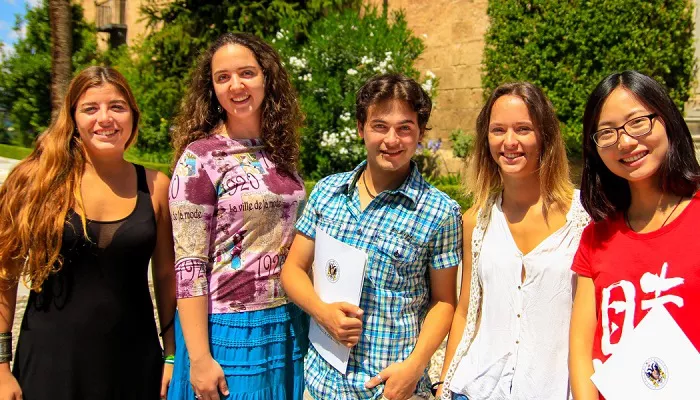Granada, a vibrant Andalusian city, is not just known for its stunning palaces and mountain views—it’s also a top destination for international students. The University of Granada (UGR), with its centuries-old history, is a major academic hub, offering a unique blend of traditional Spanish culture and a youthful, international atmosphere. Whether you’re planning to immerse yourself in the Spanish language or pursue a degree in medicine or business, Granada has a welcoming environment for students from around the world.
Why Granada is Great for Students
Granada is one of Spain’s most student-friendly cities, making it a perfect destination for those looking to study abroad. With students filling the cafés, libraries, and public spaces, the city offers an energetic and inclusive vibe. Local bars serve up free tapas with your drink, and the city’s walkability ensures you’ll often bump into friends as you make your way through town.
The city’s friendly locals, coupled with its regular events like flamenco performances and live music, create a dynamic social scene for students. Whether you’re here for a semester of Erasmus, a full degree, or to study Spanish, settling into life in Granada is easy and enjoyable.
Best Places to Study in Granada
Granada offers a variety of educational institutions, with the University of Granada (UGR) being the standout choice. Established in the 16th century, UGR is highly regarded, particularly in fields like medicine, law, translation, and the sciences. The university’s Centro de Lenguas Modernas is a hotspot for those looking to improve their Spanish language skills.
In addition to the University of Granada, private schools such as Escuela Internacional de Gerencia (EIG) focus on business and management, often offering international programs. Students can also find specialized colleges in fields like tourism, hospitality, and IT.
Popular Courses for International Students
Granada is renowned for its diverse academic offerings, but some fields stand out more than others for international students. For example, medicine is one of the university’s most respected programs. The city boasts excellent research facilities in areas such as neuroscience, genetics, and cardiovascular medicine, often in collaboration with hospitals and research centers across Europe.
If you’re interested in business or management, Granada also offers various options at both the undergraduate and postgraduate levels, particularly through institutions like EIG.
While most undergraduate courses are taught in Spanish, UGR also offers several master’s programs in English, particularly in international relations, business, and engineering. Erasmus students can often find individual modules taught in English.
How to Study in Granada
University of Granada Admission Requirements
EU students typically need a secondary school leaving certificate equivalent to Spain’s Bachillerato. Competitive courses like medicine and architecture may require higher grades and sometimes an entrance exam.
For non-EU students, the process is slightly more complicated. First, you’ll need to have your secondary education homologated by Spain’s Ministry of Education—a process that can take several months. Additionally, many programs require the Pruebas de Competencias Específicas (PCE), which are entrance exams for specific fields.
The University of Granada has an acceptance rate of around 51%, although it can vary by program. Competitive fields like medicine and psychology tend to have lower acceptance rates, and non-EU students may face additional hurdles due to limited spots for international applicants.
Cost of Studying in Granada
Granada is known for its affordable lifestyle, which is a major draw for students. Tuition fees at the University of Granada range from €1,500 to €3,500 per year for an undergraduate degree, while a master’s program costs between €3,000 and €5,000. MBA programs can be slightly more expensive. Fees are generally higher for international students but are still considered affordable by European standards.
If you’re looking to learn Spanish, language courses in Granada range from €200 per week for group classes, with additional options for private lessons and cultural activities like flamenco workshops.
Accommodation
Granada offers a wide range of accommodation options. University residences are a popular choice and often include meals and utilities, but spaces fill quickly, so early applications are essential.
Many students opt for shared flats, particularly in neighborhoods like Realejo and around the Facultades. Rent for a room in a shared flat starts from €200 per month, with utilities around €50. If you prefer more privacy, studio apartments in student-friendly areas start at €450 per month.
For convenience, you can book accommodation through online platforms like idealista to secure your living arrangements ahead of time.
Is Granada Safe for Students?
Granada is generally very safe, thanks to its large student population and compact city center. The Albaicín, Centro, and university areas are well-patrolled, and you’ll feel comfortable walking around, even at night. While petty theft can occasionally occur in tourist-heavy spots like the Alhambra, violent crime is rare.
Practical Tips for International Students
Granada is a welcoming city for international students, with plenty of groups and resources to help you settle in. ESN Granada, for example, offers everything from welcome picnics to city tours and weekend trips around Andalusia.
Most international students open a Santander or BBVA account, both of which offer student-friendly perks. The university can assist with registering for public healthcare, which is available to EU students, though non-EU students will need private health insurance.
What to Pack for Granada
Granada’s weather can be unpredictable, with hot summers reaching over 35°C, but chilly winter nights. Be sure to pack appropriately for both extremes. If you’re coming from outside the EU, remember that Spain uses European plug types C/F, so don’t forget to bring adapters for your electronics. Also, it’s a good idea to bring digital and paper copies of your important documents, such as your student visa, health insurance, and academic records.


